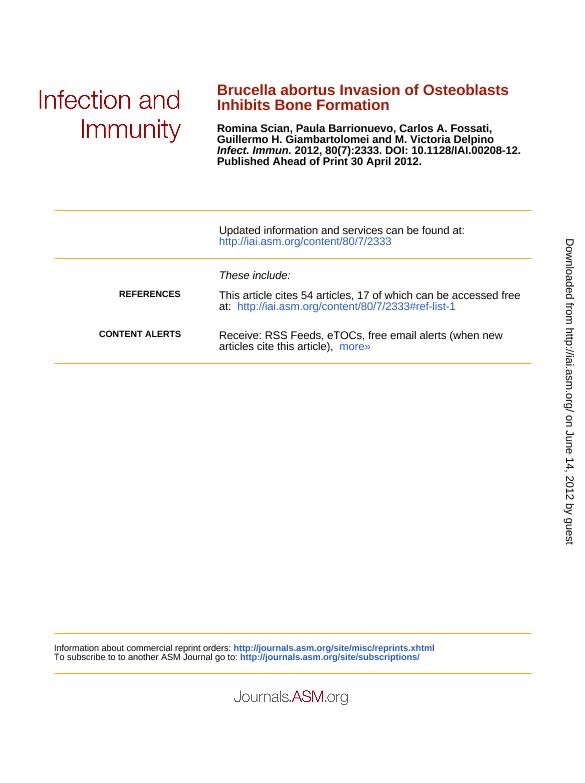Artículo
Brucella abortus invasion of osteoblasts inhibits bone formation
Scian, Romina ; Barrionuevo, Paula
; Barrionuevo, Paula ; Fossati, Carlos Alberto
; Fossati, Carlos Alberto ; Giambartolomei, Guillermo Hernan
; Giambartolomei, Guillermo Hernan ; Delpino, María Victoria
; Delpino, María Victoria
 ; Barrionuevo, Paula
; Barrionuevo, Paula ; Fossati, Carlos Alberto
; Fossati, Carlos Alberto ; Giambartolomei, Guillermo Hernan
; Giambartolomei, Guillermo Hernan ; Delpino, María Victoria
; Delpino, María Victoria
Fecha de publicación:
12/06/2012
Editorial:
American Society for Microbiology
Revista:
Infection and Immunity
ISSN:
0019-9567
Idioma:
Inglés
Tipo de recurso:
Artículo publicado
Clasificación temática:
Resumen
Osteoarticular brucellosis is the most common presentation of the active disease in humans. Loss of bone is a serious complication of localized bacterial infection of bones or the adjacent tissue, and brucellosis proved not to be the exception. The skeleton is a dynamic organ system which is constantly remodeled. Osteoblasts are responsible for the deposition of bone matrix and are thought to facilitate the calcification and mineralization of the bone matrix, and their function could be altered under infectious conditions. In this article, we describe immune mechanisms whereby Brucella abortus may invade and replicate within osteoblasts, inducing apoptosis, inhibiting mineral and organic matrix deposition, and inducing upregulation of RANKL expression. Additionally, all of these mechanisms contributed in different ways to bone loss. These processes implicate the activation of signaling pathways (mitogen-activated protein kinases [MAPK] and caspases) involved in cytokine secretion, expression of activating molecules, and cell death of osteoblasts. In addition, considering the relevance of macrophages in intracellular Brucella survival and proinflammatory cytokine secretion in response to infection, we also investigated the role of these cells as modulators of osteoblast survival, differentiation, and function. We demonstrated that supernatants from B. abortus-infected macrophages may also mediate osteoblast apoptosis and inhibit osteoblast function in a process that is dependent on the presence of tumor necrosis factor alpha (TNF-α). These results indicate that B. abortus may directly and indirectly harm osteoblast function, contributing to the bone and joint destruction observed in patients with osteoarticular complications of brucellosis.
Palabras clave:
BRUCELLA
,
OSTEOBLAST
,
MINERALIZATION
,
INFECTION
Archivos asociados
Licencia
Identificadores
Colecciones
Articulos(IDEHU)
Articulos de INST.DE EST.DE LA INMUNIDAD HUMORAL PROF.R.A.MARGNI
Articulos de INST.DE EST.DE LA INMUNIDAD HUMORAL PROF.R.A.MARGNI
Articulos(INIGEM)
Articulos de INSTITUTO DE INMUNOLOGIA, GENETICA Y METABOLISMO
Articulos de INSTITUTO DE INMUNOLOGIA, GENETICA Y METABOLISMO
Citación
Scian, Romina; Barrionuevo, Paula; Fossati, Carlos Alberto; Giambartolomei, Guillermo Hernan; Delpino, María Victoria; Brucella abortus invasion of osteoblasts inhibits bone formation; American Society for Microbiology; Infection and Immunity; 80; 7; 12-6-2012; 2333-2345
Compartir
Altmétricas



